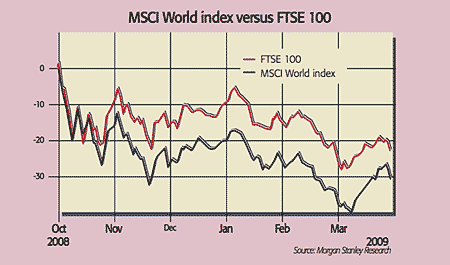Get the latest financial news, insights and expert analysis from our award-winning MoneyWeek team, to help you understand what really matters when it comes to your finances.
You are now subscribed
Your newsletter sign-up was successful
Want to add more newsletters?

Twice daily
MoneyWeek
Get the latest financial news, insights and expert analysis from our award-winning MoneyWeek team, to help you understand what really matters when it comes to your finances.

Four times a week
Look After My Bills
Sign up to our free money-saving newsletter, filled with the latest news and expert advice to help you find the best tips and deals for managing your bills. Start saving today!
"There's nothing like a 20%-odd rally to bring knackered bulls to their feet," says Lex in the FT. By the end of last week, the S&P 500 and the MSCI World index had gained more than 20% from their March lows and other major indices weren't far behind. Optimism has spread, with Barclays Capital declaring last week that "the bear market is probably over" earnings expectations are now so low that any surprises are likely to be positive, and the global recession is starting to bottom out. Goldman Sachs, meanwhile, has developed a model that implies average annual real returns over the next five years of 20%-25% in Britain, 15%-20% in continental Europe and 10%-15% in America.
But a setback on Monday, with markets falling by 3%-5% across the world, was a stark reminder of the bumpy road ahead. Investors were rattled by the US administration's warning that some American banks would need more government aid. Meanwhile, Spain's government has had to bail out Caja Castilla, a regional lender. With the housing market collapsing and unemployment rocketing, this won't be the last Spanish bail-out.

After the crisis caused by toxic securitised assets, financials are now being hit by the economic downturn, says Wolfgang Munchau in the FT. The German economy is expected to shrink by 6%-7% this year, implying that corporate and private defaults are set to "increase massively". The latest American plan "is not going to reverse" the expected deterioration in capital ratios quickly and comprehensively enough, and European banks will also need more capital. Until then, banks will keep shrinking their balance sheets by cutting lending exacerbating the default problem in a "vicious circle".
MoneyWeek
Subscribe to MoneyWeek today and get your first six magazine issues absolutely FREE

Sign up to Money Morning
Don't miss the latest investment and personal finances news, market analysis, plus money-saving tips with our free twice-daily newsletter
Don't miss the latest investment and personal finances news, market analysis, plus money-saving tips with our free twice-daily newsletter
Nouriel Roubini of New York University, who predicted the crisis, expects some US banks to go "belly up" and be nationalised; the stockmarket is "a bit ahead" of the financial news. This is a "bear market rally", he says. "We are not going to get anything sustainable," agrees fund manager Stephen Docherty, "until we get a solution to the financial system".
Nor is there much to get excited about on the macroeconomic and earnings front. American house prices are sliding at a record annual rate and declining wealth is likely to continue prompting households to rebuild their savings; the savings ratio has risen much less than in past crises. Demand is also set to keep easing in Britain, where, says Capital Economics, the New Year rebound in consumer spending is fading. Earnings are thus unlikely to trough soon, as Morgan Stanley noted early this week when it advised investors to sell the US rally. Gary Shilling of A. Gary Shilling & Co expects the S&P 500 to fall to 600.
And what of valuation, the main determinant of long-term returns? The cheaper stocks are when you buy, the more money you will make. Goldman Sachs's model covers factors ranging from macroeconomic variables to dividends and the equity-risk premium to conclude that stocks are "unusually cheap". A simpler approach looks at the future returns that have historically been available when the market has reached certain p/e levels. These ratios are hard to pin down at present because earnings keep slipping, so the cyclically adjusted p/e ratio is a better bet.
This measure, which uses the average of earnings over the past decade, is at 10.4 in Britain, says Andrew Lapthorne of Socit Gnral. In America, it's around 14. That implies real annual average returns of up to 6% over the next decade in the US, and about 7% in Britain. However, the cyclical p/e is low, but not yet at rock-bottom levels; it has previously troughed in single digits which would imply higher annual returns over the subsequent decade. With the turmoil not over yet, investors are likely to get a chance to buy even cheaper and do even better.
Get the latest financial news, insights and expert analysis from our award-winning MoneyWeek team, to help you understand what really matters when it comes to your finances.
MoneyWeek is written by a team of experienced and award-winning journalists, plus expert columnists. As well as daily digital news and features, MoneyWeek also publishes a weekly magazine, covering investing and personal finance. From share tips, pensions, gold to practical investment tips - we provide a round-up to help you make money and keep it.
-
 Should you buy an active ETF?
Should you buy an active ETF?ETFs are often mischaracterised as passive products, but they can be a convenient way to add active management to your portfolio
-
 Power up your pension before 5 April – easy ways to save before the tax year end
Power up your pension before 5 April – easy ways to save before the tax year endWith the end of the tax year looming, pension savers currently have a window to review and maximise what’s going into their retirement funds – we look at how

